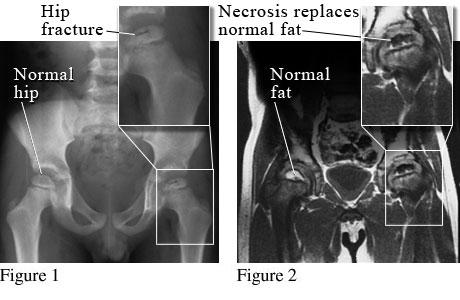Legg-Calve-Perthes disease (LCPD)
Legg-Calve-Perthes disease (LCPD) is a disorder of the upper part of the thighbone (head of the femur) that causes breakdown of the head of the femur. This is followed by new bone formation.
LCPD develops because of loss of blood flow to the head of the femur. This causes breakdown (avascular necrosis) and deformity of the femur where it connects with the hip socket. The bone reforms in the hip area when the blood supply returns to normal. During this time, the femur is soft and may easily fracture and collapse. The head of the femur heals in an abnormal shape and does not fit properly into the hip socket, causing stiffness and pain.
The cause of LCPD is unknown. It occurs most often in children ages 3 to 12. Boys are affected about 4 to 5 times as often as girls. Usually only one hip is affected, although it is possible to have LCPD in both hips.
Symptoms include pain, limping or an uneven gait, decreased movement, loss of height, and loss of muscle mass in the thigh. Treatment depends on the severity of symptoms but may include physical therapy, a brace or cast, or surgery. Occasionally the disease heals on its own without treatment.
X-Ray and MRI of Legg-Calve-Perthes Disease

Courtesy of Paul Traughber, M.D., Boise, Idaho.
Figure 1 is an X-ray of a child's normal hipbone and a broken (fractured) hipbone from poor blood flow because of Legg-Calve-Perthes disease (LCPD). Figure 2 is an MRI of a child's normal hipbone with fat in the growth center and an abnormal hipbone where the fat has been lost because of LCPD.
©2011-2025 Healthwise, Incorporated
